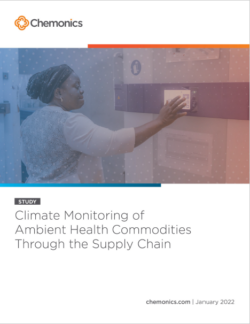
Climate Monitoring of Ambient Health Commodities Through the Supply Chain .
Paper | January 31, 2022

This study aims to provide new data and analysis for supply chain actors to better manage climate excursions in lower- and-middle-income countries.
Throughout the health supply chain, pharmaceutical commodities are exposed to many varying climate conditions — such as temperature, humidity, light, pressure, and shock — that could potentially affect their integrity and efficacy. The Climate Monitoring of Ambient Health Commodities through the Supply Chain study aims to provide new data and analysis for supply chain actors to better manage climate excursions in lower- and-middle-income countries. Since 2017 and for this study, Chemonics, with the support of the Bill and Melinda Gates Foundation, installed climate sensors in two countries’ warehouses and trucks, as well as in six air and sea shipments from three countries, collecting data from 2018 to 2021. This study combines a literature review, key informant interviews, and data collected from these sensors to draw conclusions and recommendations. This paper details findings related to in country temperatures and humidity in addition to light, pressure, and shock for global shipments. The duration and magnitude of these findings are explored in detail. It is important to note that given that this study tracks only the environment where commodities are transport or stored, it cannot draw any conclusions or linkages on actual impact of quality or effectiveness of commodities. Finally, based on available best practices on our literature review and feedback from key informant interviews, we include five recommendations:
- Target high-inventory turnovers.
- Keep health commodities moving quickly and efficiently.
- Leverage the internet of things to collect and analyze data for decision-making.
- Redesign health commodities composition and/or packaging to better adapt to the conditions at the last mile.
- Apply climate monitoring-related good distribution practices to manage your supply chain.
